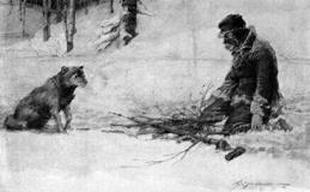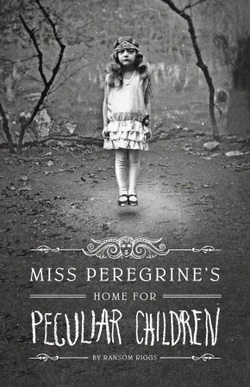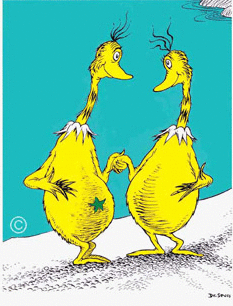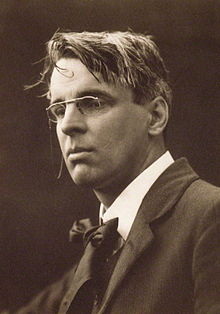
Naturalism: An extreme form of realism, naturalism in fiction involves the depiction of life objectively and precisely, without idealizing. However, the naturalist creates characters who are victims of environmental forces and internal drives beyond their comprehension and control. Naturalistic fiction conveys the belief that universal forces result in an indifference to human suffering.
"To Build a Fire" showed naturalism. The man suffered in the very cold weather. The natural force of weather he could not change. He failed to make a fire in the blistering freezing weather that he died. "Then the man drowsed off into what seemed to him the most comfortable and satisfying sleep he had ever known," was when he could not fight the cold any longer and end his suffering by giving up.
Death is part of nature and man cannot stop it. The man could not live like the dog who didn't need clothes or fire to survive. The man tried his best to survive on nature alone. The dog didn't need the man's help the whole time, for it found its way to the camp. "Then it turned and trotted up the trail in the direction of the camp it knew, where were the other food providers and fire providers." The quote states the dog lived and was fine without the man.
An allegory is a work with two levels of meaning, a literal one and a symbolic one. In such a work, most of the characters, objects, settings, and events represent abstract qualities. Personification is often used in traditional allegories. As in a fable or parable, the purpose of an allegory may be to convey truths about life, to teach religious or moral lessons, or to criticize social institutions. The story of the Sneetches was an allegory written by Dr. Seuss. There were two meanings in the story. The literal meaning is one type of Sneetch thought they were better because they have a star on their belly and the other type did not. The symbolic meaning is the moral of the story and the lesson. No one is better than anyone, no matter what each person looks like. What you look like does not define you. One type of Sneetch wanted to stay different and the other wanted to be the same to be cool. McMonkey McBean put stars on them for a fee so they could all have stars on their belly and then he eventually took off the stars of the Sneetches that had in the first place. That went back and forth all day. Eventually when McMonkey McBean left and the two type of Sneetches ran out of money, they did not care what they look like, they were all friends. In the end, everyone can be friends even though you may look different. Embrace being different.
"The Unknown Citizen" is pretty ironic. All these accomplishments this person get aren't true accomplishments. They're a joke. The title is ironic because with all these "good" things this citizen did, he was still unknown.
The author is saying that happiness and freedom isn't necessary to men which is false and the opposite. Auden is explaining sarcastically these average everyday things this citizen does and glorifying them. He's no one special in reality. If Auden actually was straight forward, it would've been less entertaining and funny. This way he can capture the reader's attention.
Situational:
1. A traffic cop gets his license suspended for unpaid parking tickets.
2. An ambulance goes to a bike accident scene and runs over the victim because the person crawled into the road.
3. A tow truck being towed.
Dramatic:
1. In a murder movie, you know the killer is in the building but the character doesn't know.
2. In Romeo and Juliet, when Juliet was in a drugged sleep. The audience knew but Romeo didn't. So Romeo killed himself because he thought Juliet was dead.
3. When someone goes on a show like Ellen and the person went on there thinking he was lucky but instead went on there to meet his long lost sister. The crowd already knew though.
Verbal:
1. When a person sees someone with an ugly shirt on and they say "Nice shirt you have on". (In a sarcastic voice of course)
2. When kids play video games and the mom comes in and says "Oh when you think you're done with that very important game, maybe spend some time doing homework or something".
3. When someone replies to you saying, "you're cool".
THE SECOND COMING
Turning and turning in the widening gyre
The falcon cannot hear the falconer;
Things fall apart; the centre cannot hold;
Mere anarchy is loosed upon the world,
The blood-dimmed tide is loosed, and everywhere
The ceremony of innocence is drowned;
The best lack all conviction, while the worst
Are full of passionate intensity.
Surely some revelation is at hand;
Surely the Second Coming is at hand.
The Second Coming! Hardly are those words out
When a vast image out of Spiritus Mundi
Troubles my sight: a waste of desert sand;
A shape with lion body and the head of a man,
A gaze blank and pitiless as the sun,
Is moving its slow thighs, while all about it
Wind shadows of the indignant desert birds.
The darkness drops again but now I know
That twenty centuries of stony sleep
Were vexed to nightmare by a rocking cradle,
And what rough beast, its hour come round at last,
Slouches towards Bethlehem to be born?
Interpretation: "The falcon cannot hear the falconer" line isn't saying the falcon is deaf but saying it's focused on the world and occupied on that. The world is going to chaos. The line, "And what rough beast, its hour come round at last". It's saying that Jesus is being born
I read the book, Miss Peregrine's Home For Peculiar Children.
The big question is, how far would you go to find out the truth?
An example of this in the book is when Jacob trying to find out what his grandpa told him is true. His grandpa told him stories of peculiar children but Jacob did not know whether to believe him or not so he went on an adventure to seek the truth. A big adventure that no normal kid would go on. Most kids would not care but Jacob cared enough to do what he could to find if his grandpa's stories were true. So the answer to this question is if you want to know the truth bad enough, you will do anything in your power to find out. Jacob went through a lot just find out if the silly tales his grandpa had told him were true. Jacob wanted to know really bad and it was all worth it. Next time if you want to know the truth, ask yourself how bad? If you really want to know the truth, then do everything you possibly can to find it out. In the end it will be worth it and you will be satisfied.

I just finished Miss Peregine's Home For Peculiar Children and I enjoyed it. A lot of people didn't care for the ending but it just leads to a suspected sequel.
An element of the book is individuality. An example would be that Jacob and the other peculiar children have their own specific ability that no one else has.
Book Titles:
Miss Peregrine's Home For Peculiar Children
The Absolutely True Diary of a Part-Time Indian
Magazine Titles:
Men's Fitness
Rolling Stone
Movie Titles:
Coach Carter
Glory Road
Newspaper Titles:
The Morning Sun
The Daily Telegraph
Newspaper Article Titles:
"U.S. Declares War"
"The New Titanic Sinks"
Poem Titles:
"The Raven"
"Where the Sidewalk Ends"
2 rules: 1. Writing Intention 2. What the noun ends with such as "s"
Singular:
That's the kid's toy.
That is the dog's bone.
Plural:
Those are the kids' toys.
Those are the dogs' bones.
The 2 rules for conjunctive adverbs are:
1. Making a compound sentence
2. In the middle of an independent clause
Examples:
I like chilling in the sun; however, I burn very fast.
I am, however, pretty intelligent.
Examples:
Commas and Conjunctions - I don't mind school, but I hate waking up early.
Colon - I love music: hip hop is my favorite.
Semicolon - I walked into school; I went to my locker.




 RSS Feed
RSS Feed